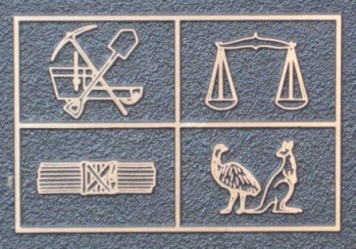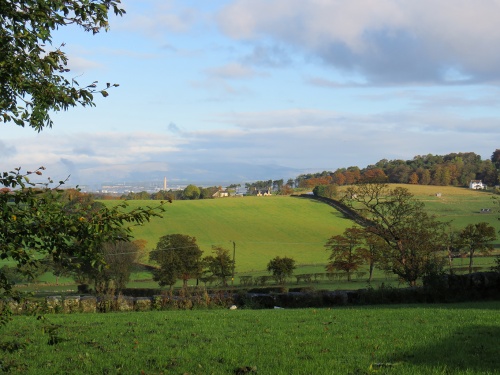William Denovan

Contents
Background
William Dixon Campbell Denovan was born in 1829 at Edinburgh in Scotland, the son Francis Garden and Margaret Denovan.[1] When news of the 1851 gold rush in Australia reached Scotland, he closed his Fifeshire school that he had set up as an 18 years old. He boarded the Mobile at Liverpool arriving in Melbourne in October 1852.[2] William Denovan is buried in the Bendigo Cemetery.
Goldfields Involvement, 1854
Denovan first headed for the Mt Alexander diggings, then to Bendigo where he in February 1853. He was aware that the miners deeply resented the license fee. By day, Denovan worked his claims but by night often engaged in activities seeking to redress local grievances by writing to newspapers and speaking at public meetings. On the 26 August 1854, Denovan convened a large meeting of the diggers. 3,000 people gathered near Bendigo's Criterion Hotel to consider forming a league aiming to abolish the license tax and to have elected representative in Parliament. This agitation of the Bendigo miners was known as the Red Ribbon Rebellion.[3]
Reforms were slow in coming so another larger meeting was held at Bendigo on 14 October 1854. Denovan was appointed delegate representing the Bendigo diggers. On 03 December 1854 , he set out on foot for Ballarat to attend a general meeting of the Goldfields Reform League. He stayed the first night in Castlemaine and the following morning heard of the Eureka Stockade. On reaching Creswick, he learned martial law had been proclaimed within a 10-mile radius of Ballarat and considering that discretion was the better part of valour, returned to Castlemaine. [4]
Denovan returned to Bendigo wearing a red ribbon, a black armband out of respect for the Eureka casualties and a red shirt. [5] By 1854 his zeal for reform had won him prominence as a goldfields leader and election as a diggers' representative at the Gold Fields Commission.[6]
Post 1854 Experiences
Towards the end of 1855 Denovan moved to Ballarat becoming involved in journalism at the Ballarat Times and then the Ballarat Star. He launched his own weekly newspaper called the Nation and Ballarat Advertiser, which, although quite successful at first, put an untenable demand on his personal finances. After ten months he returned to Bendigo with less than £1 in his pocket.[7]
In 1856 Denovan returned to his mining pursuits after a short stint as a gold buyer for the Bank of Victoria. He was one of the original members of the land league, formed in 1857, that was influential in unlocking the lands of Victoria from the monopoly of the squatters. In 1861 he was elected to represent the Sandhurst Boroughs in the Legislative Assembly. The mining community, holding him in high regard, paid his election expenses of £147 and subscribed an honorarium of £280. He found that life in Parliament was no place for a person of limited means and had to resign. However, while in Parliament he was instrumental in securing a grant of £2,000 for the purpose of surveying and reporting the feasibility of diverting water from the Coliban River to the goldfields.[8]
After Parliament Denovan returned to mining for a few months and then edited the Bendigo Evening News for two years. In 1867 he became a stock and share broker and one of the original members of the Bendigo Stock Exchange. During the next few years he made and lost a lot of money through mining speculation.[9]
In 1877, Denovan was elected to the Bendigo City Council and would have automatically become a Trustee of the Bendigo Cemetery, which was under Council’s control. In September 1879 he was appointed Town Clerk. D[10]
Denovan always had a leaning towards literary pursuits and in 1882 published a book entitled The Evidences of Spiritualism, a subject in which he was deeply interested. [11]
Denovan also wrote many articles for local and metropolitan newspapers on a wide range of topics and was a prominent member of the Masonic fraternity. Denovan was a man of unblemished character and possessed a reputation for dignity and integrity. He had experienced the rigours and fortunes of the early pioneers and certainly had an influence in the development of the first fifty years of Bendigo.[12]
Newsworthy
- THE LATE CAPTAIN HARRISON.
- (To the Editor of the Bendigo Advertiser.)
- Sir,-Your Melbourne correspondent in his letter which appeared in your issue of to-day, gives a short account of the career of the late Captain Harrison on Bendigo during the anti licence agitations of the period, which, let me say, is incorrect in several particulars, and which, in justice to the deceased gentleman's memory, I wish to correct. Captain Harrison never entered into an engagement to hold meetings at the Black Swan in opposition to the digger's meetings conducted by the late Robert Benson and myself in front of the Shamrock. The facts are these: We only held two or three meetings there, and on the same days "Captain" Brown - with whom we would have nothing to do - held opposition meetings at the Black Swan, and which were better attended than ours for a time or two, until the novelty of his appearance wore off. The "bullock dray" too, must be pure imagination, as on the two or three occasions we met near the Shamrock, we had a platform erected. The last time I remember hearing Captain Harrison address the diggers, was at one of our meetings held where All Saints' Church now stands, and at a subsequent meeting I distinctly remember my making a collection for him, he being in poor circumstances at the time. Captain Harrison never had much to do with the anti-licence movement started by G.E. Thompson, Captain Brown, Dr Wall, Mr Hopkins, and myself, he having retired from the field after his efforts were successful in preventing the licence tax being raised from 30s to L3.
- I am sir, yours truly,
- W.D.C. DENOVAN,
- Golden-square, 24th July, 1869.[13]
See also
Further Reading
- GREAT ANTI-LICENSE DEMONSTRATION AT SIMSON’S DIGGINGS – A monster meeting was held on Saturday week, at Simson’s Diggings near the Golden Age Hotel, Main St, called by Mr Denovan delegate form the Anti-License Association, Bendigo for the purpose of adopting a memorial to the Government, and a petition to the Legislative Council, for the entire abolition of the License tax and other grievances, and also to elect an anti-license committee. [14]
References
- ↑ http://adb.anu.edu.au/biography/denovan-william-dixon-campbell-3396/text5151.
- ↑ http://bendigoheritagecemeteries.wordpress.com/tag/red-ribbon-rebellion/, viewed 16 March 2017.
- ↑ http://bendigoheritagecemeteries.wordpress.com/tag/red-ribbon-rebellion/, viewed 16 March 2017.
- ↑ http://bendigoheritagecemeteries.wordpress.com/tag/red-ribbon-rebellion/, viewed 16 March 2017.
- ↑ http://bendigoheritagecemeteries.wordpress.com/tag/red-ribbon-rebellion/, viewed 16 March 2017.
- ↑ http://adb.anu.edu.au/biography/denovan-william-dixon-campbell-3396/text5151.
- ↑ http://bendigoheritagecemeteries.wordpress.com/tag/red-ribbon-rebellion/, viewed 16 March 2017.
- ↑ http://bendigoheritagecemeteries.wordpress.com/tag/red-ribbon-rebellion/, viewed 16 March 2017.
- ↑ http://bendigoheritagecemeteries.wordpress.com/tag/red-ribbon-rebellion/, viewed 16 March 2017.
- ↑ http://bendigoheritagecemeteries.wordpress.com/tag/red-ribbon-rebellion/, viewed 16 March 2017.
- ↑ http://bendigoheritagecemeteries.wordpress.com/tag/red-ribbon-rebellion/, viewed 16 March 2017.
- ↑ http://bendigoheritagecemeteries.wordpress.com/tag/red-ribbon-rebellion/, viewed 16 March 2017.
- ↑ Bendigo Advertiser, 26 July 1869.
- ↑ Mount Alexander Mail 22 August 1854.
External links
http://adb.anu.edu.au/biography/denovan-william-dixon-campbell-3396/text5151,

